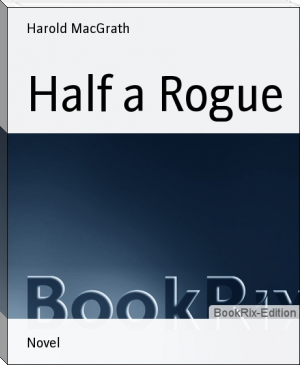The Adventures of Kathlyn - Harold MacGrath (black books to read TXT) 📗

- Author: Harold MacGrath
- Performer: -
Book online «The Adventures of Kathlyn - Harold MacGrath (black books to read TXT) 📗». Author Harold MacGrath
"A step nearer," she cried, low voiced, "and I will strike."
Umballa recoiled. This was no longer Sa'adi's houri but the young woman who had mastered the lion in the railway train. Rage supplanted the passion in his heart. Since she would not bend, she should break. As her arm sank he sprang forward like a cat and seized her wrist. He was not gentle. The dagger tinkled as it struck the marble floor. He stooped for it.
"Since you will not bend, break!" he said, and left the chamber, cold with fury.
Kathlyn sank weakly upon her pillows as Pundita ran to her side.
"What shall I do, Pundita?"
"God knows, Mem-sahib!"
"Are you a Christian?"
"Yes."
And so they comforted each other.
There was a garden in the palace grounds, lovely indeed. A fountain tinkled and fat carp swam about in the fluted marble basin. There were trellises of flowers, too. Persian roses, despite the fact that it was still winter. It was called the garden of brides.
Kathlyn, attended by Pundita, awaited there the coming of Umballa and the council. Her heart ached with bitterness and she could not think clearly. The impression that all this was some dreadful nightmare recurred to her vividly. What terrors awaited her she knew not nor could conceive. Marry that smiling demon?—for something occult told her that he was a demon. No; she was ready to die … And but a little while ago she had been working happily in the outdoor studio; the pet leopard sprawled at her feet; from the bungalow she heard the nightingale voice of Winnie, soaring in some aria of Verdi's; her father was dozing on the veranda. Out of that, into this! It was incredible. From time to time she brushed her forehead, bewildered.
In this mood, bordering on the hysterical (which is sometimes but a step to supreme courage), Durga Ram, so-called Umballa, and the council found her. The face of the former was cold, his eyes steady and expressionless.
"Has your majesty decided?" asked the eldest of the council.
"Yes," quietly.
"And your decision is?"
"No, absolutely and finally. There is no reason why I should obey any of your laws; but there is a good reason why all of you shall some day be punished for this outrage."
"Outrage! To be made queen of Allaha?" The spokesman for the council stamped his foot in wrath.
"Think!" said Umballa.
"I have thought. Let us have no more of this cat-and-mouse play. I refuse to marry you. I'd much prefer any beggar in the street. There is nothing more to be said."
"There are worse things than marriage."
"What manner of indignities have you arranged for me?" Her voice was firm, but the veins in her throat beat so hardily that they stifled her.
Said the spokesman of the council: "We have found a precedent. We find that one hundred and ninety years ago a like case confused the council of that day. They finally agreed that she must submit to two ordeals with wild beasts of the jungle. If she survived she was to be permitted to rule without hindrance. It would be a matter for the gods to decide."
"Are you really human beings?" asked Kathlyn, her lips dry. "Can you possibly commit such a dreadful crime against one who has never harmed you, who asks for nothing but the freedom to leave this country?"
Pundita secretly caught Kathlyn's hand and pressed it.
"Once more!" said Umballa, his compassion touched for the first time. But he had gone too far; for the safety of his own head he must go on.
"I am ready!"
The four men salaamed gravely. They turned, the flowing yellow robes of the council fluttering in the wind, the sun lighting with green and red fires the hilt of Umballa's sword. Not one of them but would have emptied his private coffers to undo what he had done. It was too late. Already a priest had announced the ordeals to the swarming populace. You feed a tiger to pacify him; you give a populace a spectacle.
That night Umballa did not rest particularly well. But he became determined upon one thing: no actual harm should befall Kathlyn. He would have a marksman hidden near by in both ordeals. What a woman! She was a queen, and he knew that he would go through all the hells of Hind to call her his. Long ere this he would have looted the treasure chests and swept her up on his racing elephant had he dared. Sa'adi's houri!
A thousand times he heard it through the night:
"I am ready!"
Meantime Lal Singh was hurrying on a racing camel toward the railway, toward Simla, more than a thousand miles away. He was happy. Here was the long delayed opportunity for the hand of the British Raj: a captive white woman. What better excuse was needed? There would be armed Sikhs and Gurhas and Tommies near Rawal Pindi. Ai! how time moved, how fate twisted! How the finest built castle in schemes came clattering down! At the very moment when he had secretly worked upon the king to throw himself into the protecting arms of the British Raj—assassinated! The council? Umballa? Some outsider, made mad by oppression? The egg of Brahma was strangely hatched—this curious old world!
Ahmed remained hidden in the bazaars, to await the ordeals. Nothing should harm his mistress; he was ready now and at all times to lay down his life for her; in this the British Raj came second. He had sent a courier to Bruce Sahib's bungalow, but the man had returned to report that it was still unoccupied.
And while he bit his nails in futile wrath and smoked till his tongue grew bitter, some miles away there was much confusion in the jungle by the water. Tents were being set up, native bearers and coolies were running to and fro, building fires, carrying water, hobbling the pack elephants. Wandering in and out of this animated scene was a young man, clean shaven, deeply tanned, with blue eyes which were direct, small pupiled, yet kindly. Presently he called to one of the head men.
"Ali, you might send three or four men on to the bungalow to clean up things. We shall make it tomorrow. It's but two hours' ride, but there's no hurry; and besides there's a herd of elephants behind us somewhere. They've come up far for this time of year."
"Any news worth while?"
"Yes, Sahib."
Ali made a gesture; it signified a great many things.
"Bruce Sahib will not believe."
"Believe what?" said Bruce, emptying his pipe against his heel.
"There is a white queen in the city."
"What? What bally nonsense is this?"
"It is only what I've been told, Sahib. Hare Sahib is dead."
Bruce let his pipe slip through his fingers. "Hare? Good lord!"
"Yes, Sahib. But that is not all. It seems the king went mad after we went to Africa. You remember how Hare Sahib saved him from the leopard? Well, he made Hare Sahib his heir. He had that right; the law of the childless king has always read so in Allaha. The white queen is Hare Sahib's daughter."
Bruce leaned against a tent pole. "Am I dreaming or are you?" he gasped.
"It is what they tell me, Sahib. I know it not as a fact."
"The king dead, Hare dead, and his daughter on the throne! How did she get here? And what the devil is a chap to do?" Bruce stooped and recovered his pipe and swore softly. "Ali, if this is true, then it's some devil work; and I'll wager my shooting eye that that sleek scoundrel Umballa, as they call him, is at the bottom of it. A white woman, good old Hare's daughter. I'll look into this. It's the nineteenth century, Ali, and white women are not made rulers over the brown, not of their own free will. Find out all you can and report to me," and Bruce dismissed his servant and fell to pacing before his tent.
The native who had spread this astounding news in Bruce's camp was already hastening back to the city, some fourteen miles away. He had been a bheestee (water carrier) to the house of Ramabai up to the young banker's incarceration. To him, then, he carried the news that a white hunter had arrived outside the city—"Bruce Sahib has returned!"
Ramabai lost no time in taking this news to Kathlyn.
"Ramabai, I have saved your life; save mine. Go at once to him and tell him that I am a prisoner but am called a queen; tell him I am Colonel Hare's daughter, she who traveled with him on the same ship from Hongkong to Singapore. Go! Tell him all, the death of my father and Umballa's treachery. Hasten!"
Bruce was eating his simple evening meal when Ramabai arrived.
"Bruce Sahib?"
"Yes. Your face is familiar."
"You have been twice to my bank. I am Ramabai."
"I remember. But what are you doing here?"
"I have come for aid, Sahib, aid for a young woman, white like yourself."
"Then it is true? Go ahead and let me have all the facts. She is Hare Sahib's daughter; Ali told me that. Precious rigmarole of some sort. The facts!"
"She is also the young lady who traveled in the same boat from Hongkong to Singapore." Ramabai paused to see the effect of this information.
Bruce lowered his fork slowly. The din about him dwindled away into nothing. He was again leaning over the rail, watching the phosphorescence trail away, a shoulder barely touching his: one of the few women who had ever stirred him after the first glance. In God's name, why hadn't she said something? Why hadn't she told him she was Colonel Hare's daughter? How was he to know? (For Hare, queerly enough, had never shown his young friend the photographs of his daughters.) Perhaps he had been at fault; he, too, had scarcely stirred from his shell. And where was that scoundrel Rao?
"I shall enter the city as soon as I can settle my bungalow. This rather knocks me out."
"No, Sahib; don't wait: come back with me!" Quickly he outlined the desperate straits in which Kathlyn stood. "To-morrow may be too late."
"Ali!" called Bruce, rising.
"Yes, Sahib."
"The Pasha. No questions. Give him water. Use the hunting howdah. Both guns and plenty of cartridges. That's all." The young man ran into his sleeping tent and presently came forth with a pair of ugly looking Colts; for this was before the days of the convenient automatics. "All aboard, Ramabai!" Bruce laughed; the sound was as hard and metallic as the click of the cartridge belt as he slung it round his waist; but it was music to Ramabai's ears. "Trust me. There shan't be any ordeals; not so you would notice it.… Great God! A white woman, one of my kind!… All right, Ali; quick work. Thanks!"
"There will be many pitfalls, Sahib," said Ramabai.
"Indeed!"
"I have some influence with the populace, but Umballa has the army, paid for. The priests and the council are back of him. And, after all, the priests are most to be feared. They can always sway the people through fear."
Bruce laughed again. "Either Kathlyn Hare will be free to-morrow





Comments (0)